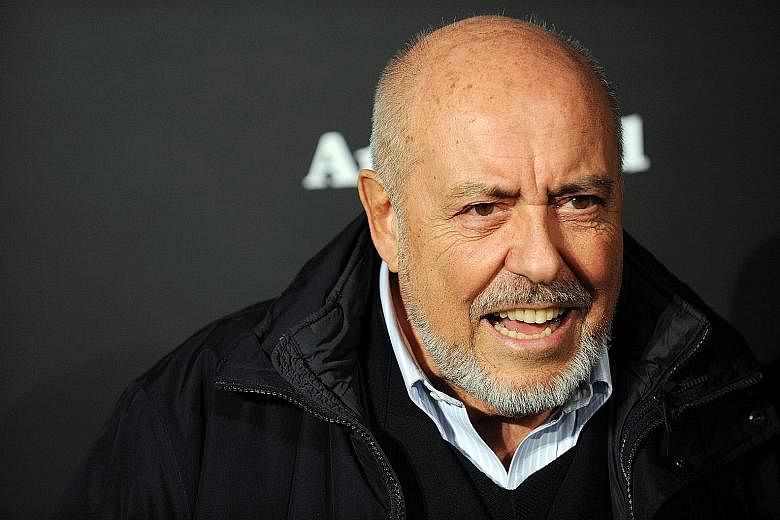NEW YORK • Elio Fiorucci, the fashion designer and retail visionary whose stores in Milan, London and New York encapsulated the flamboyance of the disco era and anticipated many later retail innovations, died on Monday at his home in Milan. He was 80.
His death was confirmed by Italian news agency ANSA. No cause was specified.
Widely regarded - indeed mythologised - as a radical thinker and mercantile guru, Fiorucci was baptised young in the retail trade.
Born in Milan on June 10, 1935, he went to work in his father's shoe boutique at 17. A seeker of wider pastures, he opened his own store in Milan in the mid-1960s, a distinctive, splashy outpost for all things "swinging London".
The shop, which he ebulliently characterised as "an amusement park of novelties", sold fluorescent hair tints, rag rugs, teapots, gold Lurex cowboy boots and the disco-spangled glad rags in which patrons danced the night away.
At its inception, it also served as a raucously colourful showcase for the quirky, inventive and darkly romantic designs of Biba, Ossie Clark and other British avant-gardists.
Fiorucci soon extended his reach beyond conventional ready-to- wear, transforming his shop into an eccentric, all-encompassing lifestyle emporium, modelled in part on the Biba store in London, a pop-culture emblem of its day.
Restlessly inventive, he was quick to make his name.
In 1970, he introduced his namesake fashion label, built largely on stretch jeans - among the first - and T-shirts decorated with the twin winged cherubs that would become the brand logo.
Pink-cheeked and smiling coyly, or peeking from behind dark glasses, they appeared not just on T-shirts but also on key chains, coffee mugs and shopping bags.
That logo soon became a highly collectible fixture in fashion capitals where Fiorucci set up new stores, including, perhaps most famously, a New York flagship on East 59th Street that opened in 1976.
The store was a breeding ground for fledgling designers and upstarts of the fashion and art worlds, among them Betsey Johnson and Anna Sui, to whom he rented concessions, and painters Keith Haring and Kenny Scharf, whose works were ostentatiously displayed.
The windows were styled by then little-known illustrator Antonio Lopez.
The Manhattan store soon forged a reputation as a funky temple of retail innovation. Its touches continue to reverberate in the malls of today.
Before turntables were commonplace at trendsetting boutiques, Fiorucci enlisted disc jockeys to spin at his store.
He was the first to hire a cadre of young fashion scouts to scour the world for the latest trends. They returned to New York bearing samples of items they had spied on the street or at the clubs where their contemporaries revelled by night.
The store developed a reputation as a daytime Studio 54, drawing a raffish mix of fashion insiders and would-be insiders of entertainment and society, including an almost- famous Madonna as well as Jacqueline Kennedy Onassis, Lauren Bacall, Yves Saint Laurent and, of course, Andy Warhol, who stopped by almost daily.
"When I was 15, instead of going to sleepaway camp, I spent the whole summer hanging out in the store," designer Marc Jacobs reminisced to The New York Times in 2001.
"I had this wide-eyed glamour about these beautiful young people who globetrotted from club to club dressing in these fabulous clothes. It was like a living, breathing fashion show that I wanted so much to be a part of."
The clothes, mostly restyled hits from the 1950s and 1960s, were rendered dazzling in Day-Glo colours and materials as varied as Lurex and plastic and animal prints.
Renegade merchant that he was, Fiorucci embraced a self-effacing personal style that ran counter to the flashy image of his stores. A vegetarian and animal-rights activist, he usually dressed in plain sweaters and trousers. As he put it on the eve of his Manhattan opening: "I am a merchant, not a man of fashion."
In 1990, he sold his company to Japanese clothing brand Edwin. It was a move he came to regret.
More than a dozen years later, after an ill-fated attempt to reopen his New York emporium, he shuttered his business and closed his original flagship in Milan.
Eleven years ago, he embarked on a new venture, introducing Love Therapy, a ready-to-wear line.
Information on survivors was not immediately available.
He discussed his retailing philosophy this year in an interview with i-D magazine.
"I wanted people to find what they came for, to be happy and spend little money to get exactly what they wanted," he said.
"Because in the end, the best thing in the world is to be loved. The greatest need of man is to be loved."
NEW YORK TIMES

